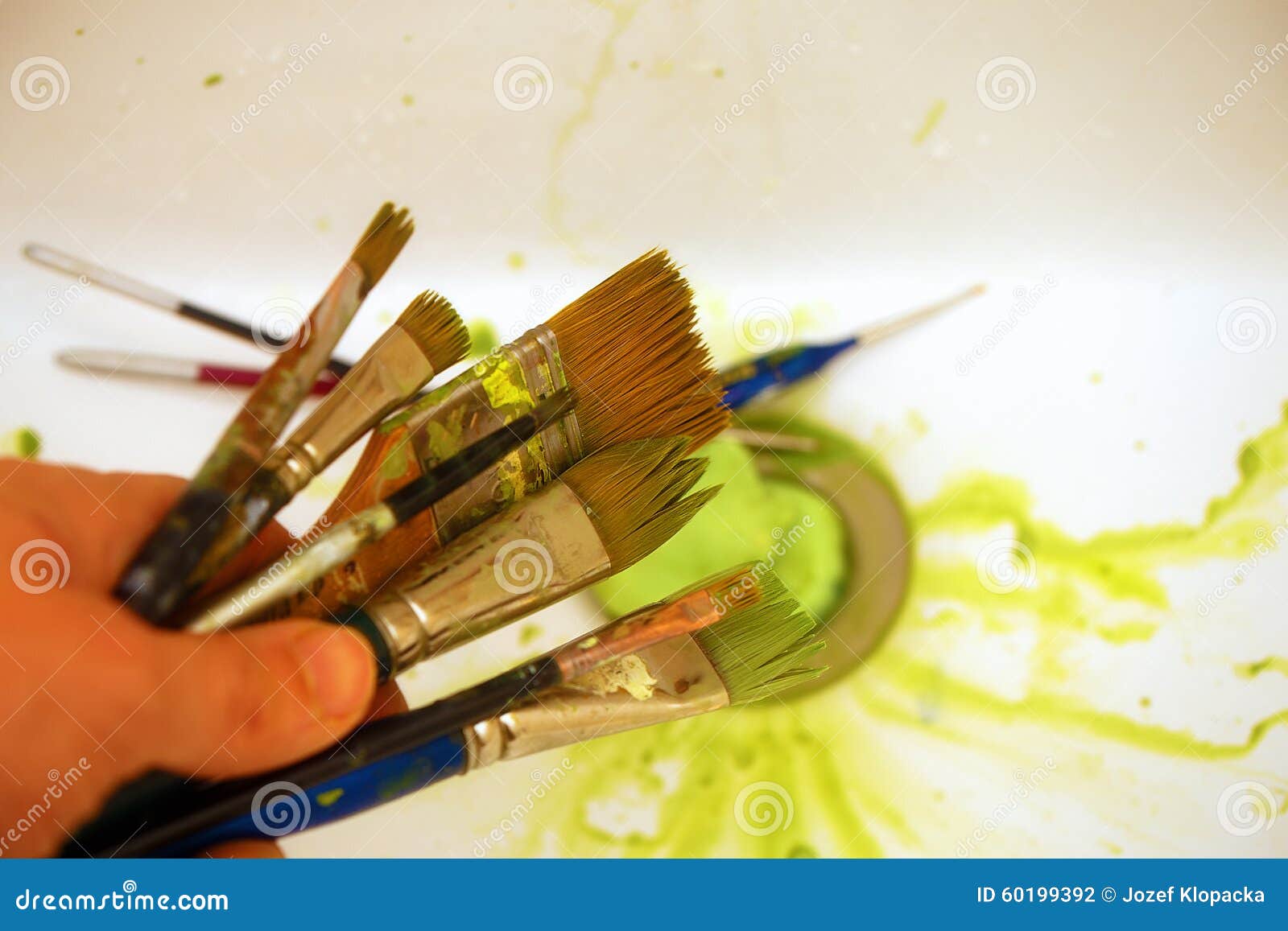Haven't any of you had any professional training at all?
I don't want to steal your thunder Kelly, but this is not Best Practice.
Trying to wash out brushes and rollers for an oil based paint in a sink and sending it down the pipes is a Bad Idea. – Jamie M Nov 30 '20 at 18:27 Not sure it's 'Bad Idea', but it's kinda pointless to try to clean oil-based paint with water. Remove as much paint as your can from your paint brush by brushing it along an old rag or paper towel. You want as little paint as possible still on your brush for a faster cleaning in the solvent. Pour 1/8 Cup of Fabric Softener and 4 Cups of warm water into your bowl or bucket. You can minimize drying time and cleanup by using water-based, or latex, paint. Latex paints produce lower levels of paint fumes than oil-based paints, and you can clean up your brushes, roller covers and paint pans with soap and water.
Don't ever put paint thinner into plastic. It will melt most kinds. Why risk a mistake? Old glass salsa jars exist for brush cleaning. label one, put some glass marbles like the flower arranging ones into the bottom to work the brush against. (Plain, not coated with shiny stuff. It'll dissolve) Trying to clean oil based paints out of brushes by just stirring them around doesn't work. If you're desperate a crumpled piece of window screen will work too but it's hard on bristles so this is not a default. Paint thinner is very flammable and an ugly toxin so you want to keep it stingy and the stuff needs to go to Hazardous Waste Disposal. Wipe those brushes really well!
If you're doing fine arts painting go buy a proper brush cleaning pot. A big size one would be good for pro house painters. Solvent sits in it for weeks and it has a sieve to work the bristles over. Paint solids drop below it. The top keeps fumes in and evaporation almost nill over weeks. Minimal exposure, clean brushes. Now wash them! I wash up to thirty brushes a day in the studio; it's just doing the dishes.
The latest tweets from @LouisFRUpdates.  The latest tweets from @louistomlinson.
The latest tweets from @louistomlinson.
Do NOT use a surfactant/ detergent 'soap'. Use a real soap, a chemically designated soap, with oil or fat in it. You can put it on a cellulose sponge and work the brushes across it to work up a lather, or just work them against your palm. If you use bar soap swipe the brushes across it. The soap cuts the oil, and the fat base conditions the bristles.If you wiped out the paint and rinsed in thinner properly there's very little to wash out. More like a post gym shower then wrestling gunk. You don't want paint in a sink drain or on the back patio. Rinse well. If you do this correctly you'll get to wear brushes out instead of throwing them away. And bristles are chosen for this exposure so they'll get better. It's just like washing your hair. Squeeze out the water and shape them, air dry.

This works for synthetic brushes too. Do not leave soap in the bristles as it will contaminate your paint next time and make a bad paint film. As for exotic paints like epoxy? Yes, use nitrile gloves and a respirator! Outside. But if the stuff is hydrocarbon based a fat soap should work too. Acetone on brushes will kill them fast, so make sure thats a really Best Practice. Again- a soap may work better. Most bristles need the conditioning.
If your brushes start to get that gunky icky feeling, soaking them in that inexpensive liquid oil soap from the grocery store (Also best for regular washing after painting) is like a spa treatment. Leave them in for two or three days. It's magic! Paint in the ferules is a ruined brush, but as regular maintenance this is amazing. I have ten year old mongoose thats still sweet. I also paint a lot.
Do not use soap on watercolor brushes. Just rinse.
This is the method professional painters use; It keeps solvent use to an absolute minimum. Reusing a cup or 12 ounces of thinner instead of blowing through gallons of it reduces exposure and that stuff has lead in it. Among other scary things. Don't use it on skin either. Paint'll fall of in 48 hours if soap or olive oil doesn't get rid of it.
Even if you use a thinner only system like the guys who paint cars using industrial paints, a cleaning pot will use less thinner and reduce your chemical exposure. They can be used in series. You can eyeball them at the big online art supply stores, and I shop at industrial supply so don't think they don't interchange. ;-D I'll try to post instructions for the homemade version.
You can clean latex paint from brushes using a kitchen or bathroom sink but to wash rollers, you'll need a utility sink. The splatter that comes from a thorough cleaning of rollers will be too messy for the kitchen or bathroom. Check the bottom of this page for videos demonstrating how to efficiently clean paint brushes and rollers.
Washing a Latex Paint Brush
Wash a brush by first scraping it on the side of the paint can to remove all the excess paint. In a sink, use a small plastic pail or food container to collect a couple of cups of warm water. Bounce the brush bristles against the bottom of the pail several times until the water is saturated with paint and then dump it out. Rinse the pail and collect a couple more cups of warm water. Bounce the brush several times in the fresh water and then dump it.
Cleaning Paint Brushes In Bathroom Sink
Repeat this process until the water remains clear when bouncing the brush. Shake all the water from brush bristles by spinning the handle back and forth between your palms or hitting the handle against the upturned toe of your shoe several times to throw the excess water off. Stand the brush with the bristles pointing up in the pail until it dries. When you're ready to paint again, flex the bristles back and forth in your hand a few times to soften them.

